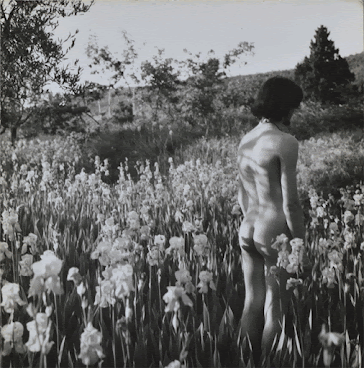'Because things don’t appear to be the known thing; they aren’t what they seemed to be
neither will they become what they might appear to become.'
Posted by Tessa den Uyl
Italy 1960's . Picture credit: Antonio Borrani
The spectator’s interpretation depends on how they consider the naked body. Even when the nude figure has inspired general acceptance in the Western world, especially in forms of art, we might think it a bit strange if we would see an undressed person walking on the street. The quintessence of humankind certainly is undressed, although we are used to seeing the body covered up.
Turning to the decade of the sixties when some of the younger generation longed for freedom from the conservatism at that time, the exaltation of the uncovered body symbolised that quest for freedom. No wonder the pureness of nudity is similar to taking off a mask. To live without pretence is nevertheless not an easy goal to set.
Indeed, almost sixty years ahead, particularly at the beach and also on the streets, bodies are surely covered up less than they were. Although that progress of freedom seems to have translated itself rather into an imposed fashion these days, than the acquisition of a free spirit, as some were looking for when this picture was taken.
In the West, nudity belongs to private atmospheres to this day, and the naked body, most often, is conflated with sexuality. To exploit nakedness is an optional which does not withstand the fact that we are all born naked. Yet somehow we seem to have trouble owning that nakedness, in which we become unspoiled by structures, and can accept ourselves not as objects or art-forms, but simply for what we are. To put it a bit crudely: for one of those standing upright animals.


6 comments:
I guess the conflicted attitude we have to our 'natural appearance' is reflected by the quiet in terms of comments here! But yes, nudity is highly sexualised and indeed nowadays we find nude bodies rather gross. I know I do - I object to people being nude (for example) in public spaces - it seems to intrude and actually be a form of aggression. 'Alpha' males and females being nude is particularly like this - asserting power, even as nudity of the mad and the poor is sad and pathetic.
Between lovers, though, it can be the opposite of aggressive - removing clothes can be a statement of trust and of offering vulnerability.
There's something of that in this picture, I feel.
During the period in which this photo was taken, nudity was seen among the youth as a symbol of political protest. An anti-establishment, finger-in-the-eye-of-big-brother gesture — to protest racism, to promote feminism, to protest the Vietnam War, to express open sexuality, to foster love over hate. Of which the 1969 Woodstock Music Festival, billed as ‘three days of peace and music’, was emblematic. Paradise gained, perhaps, rather than ‘paradise lost’. It might seem odd today that packed into the gesture of publicly removing clothes might be all this political and social symbolism.
Thank you gentlemen.
I think keith, that in those days the situation in Italy was rather distinct from what was happening in the USA. The picture was made in 1963 ( more or less) and probably comes closer to Martin's last lines in the comments. Nevertheless, even if showing a certain vulnerability (in the positive sense of the word), this was accompanied with an idealism, and is this latter term not strangely what misses out today? Idealism sounds negative now. The internet hands (virtual) experiences to be instantly consumed. There is not much space for the purity of the body to be contemplated in that, not necessary any longer, perhaps?
Yet there is something of the sixties here! Truly a "flower child"!
There was an interesting little edit behind the scenes, in this post. We inserted the words, 'In the West'. In the West, nudity belongs to private atmospheres to this day. Being 'married into Africa' myself, attitudes towards nudity may be completely different in Africa.
On the broader theme of the quest for freedom, I think that post-WWII, there was a newfound freedom which now seems again to have been lost. The concept of 'sin' became unfashionable, but curiously has returned now with a bite, although it does not have the same content as before.
Interestingly, I had a number of photos of my childhood banned by Facebook earlier this year. On appeal, they reversed their decision and apologised. It was a cultural issue, with Facebook dictating acceptable culture. The photos were taken in Pacific culture, where they were wholly acceptable. It had to do with dress codes.
Post a Comment